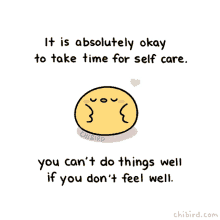*Please note: the picture above has descriptive alt text that we wrote, but is only usable for screen readers as it is a featured image.
In the Disability Community self-care is often discussed and revered, but when does self-care become counter-productive or even harmful?
When we think of self-care, we think of bath bombs and positive affirmations, which to be frank does nothing when you are in a shit-tonne of fatigue and pain. People think a positive attitude, getting outside, and eating right will cure depression and other disabilities, which just is not the case, and many Disabled people can attest to this. While no one is saying that a “healthy lifestyle” doesn’t contribute to better outcomes, this isn’t always possible for everyone. Furthermore, self-care has been monetized, trademarked and is often a capitalistic approach to Instagramable moments, which begs to question what are we really saying to Disabled people when we say get self-care?
Toxic positivity has crept into the very soul of self-care and it’s a huge problem when non-disabled people talk to Disabled people about what they should do to manage their Disability or symptoms. One of the issues with the positive self-care mindset is that if you think positively and say affirmations the symptoms will diminish making you more tolerable to be around, or that you will overcome your disability. Another problem is that meditation, exercise, and yoga is often recommended as a method of self-care from non-disabled people, mental health providers, and physicians. This can be beneficial if the Disabled person is able to do these things, but most Disabled people have financial barriers, physical barriers, and in some cases, people just don’t want to do them and that’s valid. Yoga and exercise can be very painful or the person simply can’t due to their disability, and when it comes to meditation particularly mindfulness it can actually worsen symptoms or cause harm for a small percentage of people.
Self-care should be about whatever the Disabled person needs to function, relax, or rest. Self-care is such an individualized journey that sometimes lists of self-care ideas help, while in other instances the lists become overwhelming and ineffectual. In the same vein self-care is no longer useful when it becomes an added chore. Now cue in the positivity books and videos to reframe Disability and symptoms, as if it will somehow become a part of everyday practice of self-care to uplift and minimize what the Disabled person is going through. Many of these videos and books usually blame the person for not taking their life into their own hands, or for not trying hard enough, and if the person in the video or book could do it, then it becomes an everyone can mentality. Which again may help some people, but for most Disabled people, we gain strength through finding connections within the community, with our friends, and loved ones, not in inspirational talks and books. Again, the positive self-care mindset doesn’t change the fatigue and pain that some people in the Disability Community experience, and it certainly does not cure Disabled people.
So, what does self-care look like for a Disabled person? Well, it can mean many things, such as taking medication daily, eating a meal, boundaries, sleeping, using assistive devices, being involved with a hobby, connecting with people, and the list goes on. There is no one way to practice self-care, and all forms of self-care is valid as long as it does not cause harm.
Which brings us to when non-disabled people say, “I hope you get some self-care.” They are assuming that the Disabled person is not practicing self-care, or it can make the Disabled person feel like they are not doing enough. Yes, in the non-disabled person’s eyes it’s a nice sentiment, but in reality, it really does nothing to support a Disabled person. Also, It is important to not mention self-care, appearance, or wishing Disabled people well. This does nothing to actually support Disabled people’s needs. Self-care can be difficult to practice, for some Disabled people mentioning appearance can be triggering, and wishing Disabled people well just means that people hope we will overcome our disabilities or illness, which may never happen. So please don’t focus on them, and instead focus on the things Disabled people can control and do for themselves, or offer support in some way.
Disabled people do not need the positive self-care mindset, what Disabled people need is practical self-care that fits and supports their needs. Taking back what self-care means for us as Disabled people is a form of self-care.
Here are two articles about mindfulness meditation and potential side effects:
https://www.ncbi.nlm.nih.gov/pmc/articles/PMC5353526/
https://www.verywellhealth.com/mindfulness-can-be-harmful-researchers-say-5186740

